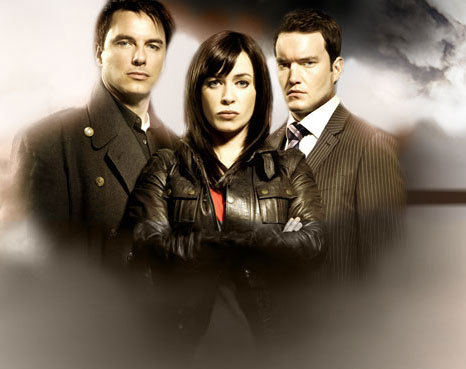 So, that was Torchwood: Children of Earth, then; for me, a big gamble that paid off. Despite John Barrowman's complaints that the five-part series felt like the show was being punished, I think that clearing the schedules for a single five-hour story was a real show of faith by the BBC and made it a real event.
So, that was Torchwood: Children of Earth, then; for me, a big gamble that paid off. Despite John Barrowman's complaints that the five-part series felt like the show was being punished, I think that clearing the schedules for a single five-hour story was a real show of faith by the BBC and made it a real event.And the fact that its audience held up so spectacularly over the week, winning its time slot throughout, suggests that it connected with a new mainstream audience that will hopefully make up for the fleeing 'ning-nongs' who feel betrayed by the people behind 'their' show.
Indeed, in one way, the big story about Children of Earth has been the fan reaction (although, as always, it's likely to be a handful of activists generating a disproportionate amount of the heat and noise).
James Moran, who co-wrote Day Three, makes himself publicly available through his funny and informative blog and Twitter feed. Or, at least, he did. After some of the crap that's been slung at him over the past week, he's decided to take a step backwards.
During my screenwriting MA, I wrote a lengthy essay on how fans reacted to Life on Mars and used it as the basis for their own creative and social endeavours. However, the vitiriolic accusations of contempt and betrayal levelled at Moran and his fellow writers reveal something else - an alarmingly possessive sense of ownership over the series.
In Russell T Davies's The Writer's Tale - an essential insight into the creative process - he bemoans the degree to which fans feel the show is 'theirs' and respond negatively to any developments that take it in a direction they don't like.
I remember Charlie Brooker talking about something similar on Screenwipe or Newswipe, when he looked at how quickly viewers complain when they see something they don't like on screen. He put it down to the prevalence of reality and talent shows, where you can vote someone off if you don't want to see them any more.
But drama works differently. When you sign up to follow a drama, you're putting yourself in the hands of the creative team. You're taking your place on the rollercoaster, and you just have to sit back and enjoy the ride. As RTD points out, drama isn't a democracy.
Anyway, from a story point of view, I think the 456 provided a classic example of what Hitchcock termed the 'McGuffin' - a device that initially seems to be the focus of the plot, but which is simply a prop to get at the themes at the true heart of the story.
While the 456 ambassador might not have had classic behind-the-sofa credentials, the real horror of the show was provided by human nature - particularly the readiness of those in authority to undertake grotesque schemes and lie to the public to serve their own ends.
I felt it ran out of steam a little towards the end, and the climax and defeat of the 456 - even at a terrible cost - seemed a little too convenient. Still, it's shown that bold programming can take an audience with it, and the five-hour epic backed up what I thought after seeing the preview of Day One at the BFI: this was Torchwood done right.


2 comments:
I really enjoyed these Torchwood episodes, a lot better than it's been in the past. The whole thing seemed strangely realistic, almost as if it was asking 'what if this really happened?' But the writers dug themselves into such a hole of doom that it must have been difficult to find a way out of it. Sending screeching noises back at the 456? Hmmm, ok.
Interesting point about how viewers feel ownership over a show. But I respect any show that's willing to kill it's cast.
Sure, I had a couple of issues with the aliens themselves: like, if they can control children to make them speak in unison, why can't they make them literally walk straight into their spaceship?
The answer: they just can't. Some concepts - particularly SF ones - have to stop *somewhere*. Anything "out of this world" so to speak can have holes picked it in it, I don't think it's possible to cover every single base as you end up in convoluted extremes.
So whilst the resolution felt a little bit rushed plot-wise, I didn't actually care: it was the characters that were simply amazing about Children of Earth. I don't dislike Torchwood, but I would never have called myself a fan or particularly "into" it. It was light-hearted, saucy fun - or so I thought. CofE turned this idea right on its head for me. As I've said on other websites, I was ACTUALLY SCARED. It felt real to me - I had to check whether my kids were still in their beds, it all felt so PLAUSIBLE!
So if the fanbrats are going off on one, it's probably because they feel like this all the time. No excuse for treating James like crap of course, but I can understand why reality blurs sometimes.
That said, fans must appreciate they do not own the process - as James says, he cannot let what people WANT influence his decisions. What's more, if people only get what they want, no challenging drama will ever be made again. And then where will be? Indulgent, candy floss nonsense sandwiched between wall to wall bloody reality TV. Yummy -*not*!
Post a Comment